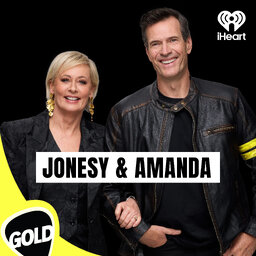🏳️🌈 KARL ZLOTKOWSKI: Proud Member Of The '78ers
Karl Zlotkowski joins Jonesy & Amanda to chat about how it feels - as a member of the '78ers - to lead 50,000 people across the Sydney Harbour Bridge for the Pride March.
In 1 playlist(s)
Jonesy & Amanda
Join Amanda Keller and Brendan ‘Jonesy’ Jones for the perfect combination of personality, relatable …Social links
Follow podcast
Recent clips

FULL SHOW: "This Is What I Live With!"
57:52

🎬 CUTTING ROOM FLOOR: Dog Seen Driving Ute On Tasmanian Beach
03:01

🎶 Fans Push Old Victoria Beckham Song To The Top Of The Charts!
04:09
 Jonesy & Amanda
Jonesy & Amanda